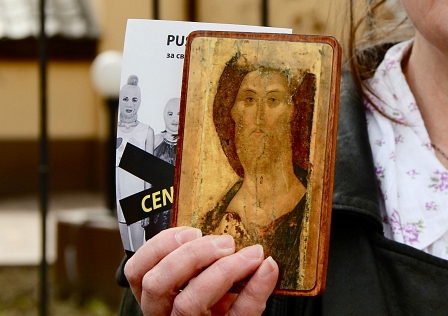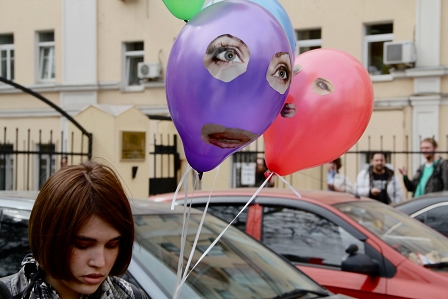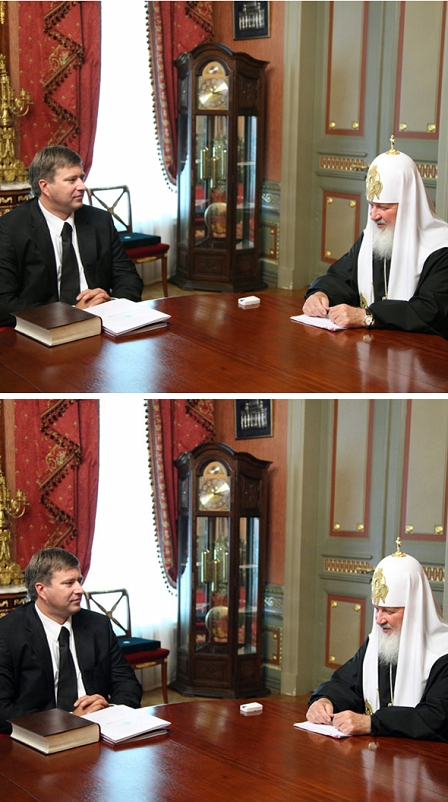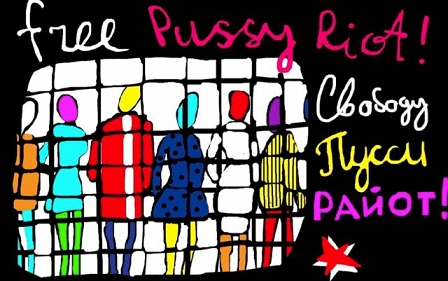Erstellt am: 24. 4. 2012 - 14:06 Uhr
Russia: Of Patriarch and Pussy Riot
This past Sunday, tens of thousands of Orthodox Russian worshippers descended on Moscow's central Christ the Savior church for an unprecedented mass prayer in "defense of faith". But despite crowds that rivaled the enormous political rallies both for and against Russian President-elect Vladimir Putin here this past winter, the message emanating from the head of Russia's Orthodox Church was one of a religion under siege.
During the service, Patriarch Kirill I spoke repeatedly of threats to the church, and urged followers to pray for protection of Russian youth from the "devil's temptations" enshrined in modern day liberal secularism.
"Our persecutors would have us believe that acts of blasphemy, sacrilege, and mockery of the sacred present a lawful excercise of human freedom," said the Patriarch. "(They think this is) something that should be protected in modern society."
The religious leader's comments reflected the church's continued concerns about 'Pussy Riot', the masked riot-girl art group whose under three-minute performance of an anti-Putin 'punk prayer' at Christ the Savior last February touched off a media firestorm and crisis within the Orthodox church.

Charles Maynes
Clergy elders, and Patriarch Kirill I in particular, have been criticized for insisting that Nadezhda Tolokonnikova, Maria Alyokhina and Yekaterina Samutsevich - the three alleged members of the group arrested in early March - face criminal charges for their actions. Even inside the church, some have issued calls for leniency, asking where are the Christian concepts of forgiveness, or barring that, basic justice? Either way the case is dividing Russians over questions of free speech, tolerance, and taste.
Amnesty International's decision to name Tolokonnikova, Alykhina, and Samutsevich political 'prisoners of conscience' has only further stoked the debate over the Church's role in society.
Questions in particular have been raised about the Patriarch's full-throated support of Vladimir Putin during Russia's recent election season (prior to the elections, Kirill called Putin "a Miracle from God"), as well as ostentatious displays of wealth that have come with that proximity to power.
An attempt to digitally scrub the public record by removing an expensive Breguet watch from the Patriarch's wrist has made Patriarch Kirill I a particularly favorite target for ridicule. (Perhaps predictably the Orthodox Church later issued a statement that the staffer responsible for the Photostop 101 gaffe would be "severely punished.")
And so the debate goes on:
Last week, a Moscow court ruled that the alleged members of the group will remain in pre-trial detention until June. Continued custody, the court argued, was necessary for their own protection (nevermind that two are mothers of small children). The women still face a possible seven year sentence under hooliganism charges when prosecutors move for trial.

Charles Maynes
The idea of three young women in masks threatening the whole of Orthodox Christianity would seem ridiculous, if it weren't true. Russian journalist Konstantin Von Eggert has called the Pussy Riot case a "watershed" moment in relations between the church, state, and society, with the church emerging as the big loser. "Christian believers versus secularists, democrats versus Putin supporters, reformist Christians versus traditionalists" he writes. "Russia’s many ideological rifts are on display here."
Indeed. As the Pussy Riot 'affair' inches forward in the courts, Russians may find it's not only bandmembers whose masks are removed. In times of real trial, everyone - eventually - shows their true face.




